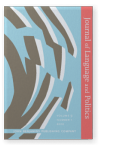The ideal of non-coherence in the World Bank’s social capital reforms
A textual analysis of “gratuitous complexity”
This paper presents an analysis of a World Bank document representing a version of the new “Social Capital” approach of International Financial Institutions (IFIs). This stance involves a rhetorical reorientation away from a much criticized unilateral approach to the poor indebted countries and to a more bi-lateral and participatory attitude. Analysis suggests that this “post-ideological” posture is reflected in the text in the form of a copious rhetoric of “complex differentiation”. This consists of characterizing the world in the abstract terms of multiple independent factors which work against any more coherent picture of the historical process and its contradictions. While such formal elements appear to be conditional on and anchored in concrete content, they are shown in fact to reflect the negation of such content (and thus coherence). In this way, an apparently limitless proliferation of free-floating isolated elements substitutes for faithful representation of the underlying social cleavages. The implications of the analysis for contrasting conceptualizations of abstraction in texts, as well as for the notion of utopian discourse, are critically discussed.
References
Billig, Michael
1995 Banal Nationalism. London: Sage.

Billig, Michael
1999 Freudian Repression. Cambridge University Press.


Das, Raju J.
2006 Putting social capital in its place.
Capital & Class 901, 65–92.


DfID
2005 Partnerships for Poverty Reduction: Rethinking Conditionality. London: DfID. Available from:
[URL]. [Accessed: December 2009].

Draper, Hal
1990 Karl Marx’s Theory of Revolution. Critique of Other Socialisms. New York: Monthly Review Press.

Eagleton, Terry
1993 The Illusions of Postmodernism. Oxford: Blackwell.

Eagleton, Terry.
2007 How to Read a Poem. Oxford: Blackwell.

Engels, Frederick.
1880/1993. Socialism. Utopian and Scientific. London: Bookmarks.
Facchinetti, Roberta
2003 Pragmatic and sociological constraints on the functions of may in contemporary British English. In:
Roberta Facchinetti,
Manfred Krug and
Frank Palmer (eds).
Modality in Contemporary English. Berlin: Mouton de Gruyter, 301–327.


Fairclough, Norman
2000.
New Labour, New Language. London: Routledge.

Fairclough, Norman.
2003 Analysing Discourse. London: Routledge.


Fine, Ben.
2001 Social Capital Versus Social Theory. London: Routledge.


Fukuyama, Francis.
1999 Social policy and civil society. Paper presented to the IMF conference on Second Generation Reforms, George Mason University, 1 October. Available from:
[URL]. [Accessed December 2009].

Giddens, Anthony.
1998 The Third Way. Cambridge: Polity.

Hammond, Phillip.
1999 Cultural identity and ideology. In:
Sergei Yerofeyev,
Simbul Akhmetova and
Mikhail Rudenko (eds).
Whose Culture? An Agenda for Social Research on Cultures in Transition, Part 1. Kazan, RF: Terra-Consulting, 150–172.

Held, David.
2002 Cosmopolitanism: ideas, realities and deficits. In:
David Held and
Anthony McGrew (eds).
Governing Globalisation. London: Polity, 305–324.

Hodge, Robert and Kress, Gunther.
1993 Language as Ideology. London: Routledge.

ILO
2005 Employment Analysis. Poverty, Income and the Working Poor. Geneva: International Labour Organisation.

IMF
1999 Conference on Second Generation Reforms [online]. Available from:
[URL]. [Accessed 5 December 2009].

IMF, and World Bank
2005 2005 Review of the Poverty Reduction Strategy Approach. Balancing Accountabilities and Scaling Up Results. Washington D.C.: IMF/World Bank. Available from:
[URL]. [Accessed 5 December 2009].

Klein, Naomi.
2007 The World Bank has the perfect standard bearer.
The Guardian 27 April.

Kumar, Deepa
2005 “What’s Good for UPS is Good For America”: Nation and Class in Network Television News Coverage of the UPS Strike.
Television and New Media. 6(2), 131–152.


Laclau, Ernesto. and Mouffe, Chantal
1985 Hegemony and Socialist Strategy: Towards a Radical Democratic Politics. London: Verso.

Lemke, Jay.
1995 Textual Politics. London: Taylor & Francis Ltd.

Marx, Karl. and Engels, Frederick
1848/1998 The Communist Manifesto. London: Verso.

Matthews, Richard
2003 Modal auxiliary constructions, TAM and interrogatives. In:
Roberta Facchinetti,
Manfred Krug and
Frank Palmer (eds).
Modality in Contemporary English. Berlin: Mouton de Gruyter, 47–70.


Medvedev, Pavel N./Bakhtin, Mikhail M.
1978 The Formal Method in Literary Scholarship. Baltimore: John Hopkins University Press.

Nikula, Tarja.
1996 Pragmatic Force Modifiers. Jyvaskyla, Finland: University of Jyvaskyla.

Ollman, Bertell
1993 Dialectical Investigations. New York: Routledge.

Palmer, Frank R.
1990 Modality and English Modals. London: Longman.

Palmer, Frank R.
2003 Modality in English: Theoretical, descriptive and typological issues. In:
Roberta Facchinetti,
Manfred Krug and
Frank Palmer (eds).
Modality in Contemporary English. Berlin: Mouton de Gruyter, 1–17.


Sparks, Colin.
1996 Stuart Hall, cultural studies and Marxism. In:
David Morley and
Kuan-Hsing Chen (eds).
Stuart Hall: Critical Dialogues in Cultural Studies. London: Routledge, 71–101.

Verschueren, Jef.
1999 Understanding Pragmatics. London: Arnold.

Weltman, David.
2003 The pragmatics of peremptory assertion: An ideological analysis of the use of the word “just” in local politicians’ denials of politics.
Discourse and Society 14(3), 349–373.

Wetherell, Margeret.
2003 Racism and the analysis of cultural resources in interviews. In:
Harry van den Berg,
Margeret Wetherell and
Hanneke Houtkoop-Steenstra (eds).
Analyzing race talk. Cambridge University Press, 11–30.

Wittgenstein, Ludwig.
1953 Philosophical Investigations. Oxford: Blackwell.

Woods, Ngaire.
2002 Global governance and the role of institutions. In:
David Held and
Anthony McGrew (eds).
Governing Globalisation. London: Polity, 25–45.

World Bank
2004a Economies in Transition: An OED Evaluation of World Bank Assistance. Washington D.C.: World Bank.

World Bank
2004b Building Market Institutions in South Eastern Europe. Washington D.C: IBRD/World Bank.

World Bank
2005 Issues and Options for Improving Engagement between the World Bank and Civil Society Organisations. Washington D.C.: World Bank. Available from:
[URL]. [Accessed: 5 December 2009].

Zamparelli, Roberto.
2005 Introduction: Some Questions About (In)Definiteness.
Lingua 1151, 759–766.


Cited by
Cited by 1 other publications
Vavrus, Frances & Christina Kwauk
2013.
The new abolitionists? The World Bank and the ‘boldness’ of global school fee elimination reforms.
Discourse: Studies in the Cultural Politics of Education 34:3
► pp. 351 ff.

This list is based on CrossRef data as of 3 june 2024. Please note that it may not be complete. Sources presented here have been supplied by the respective publishers.
Any errors therein should be reported to them.
